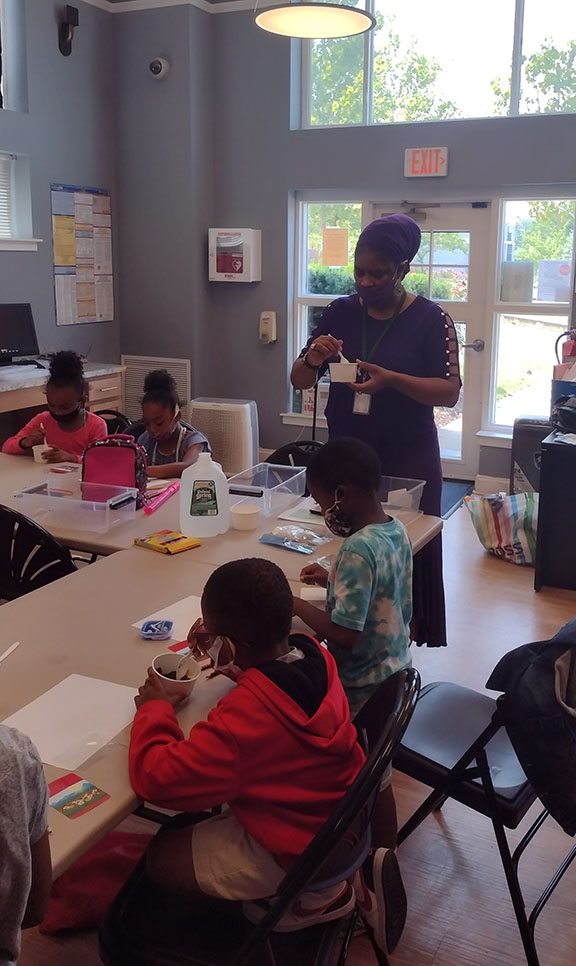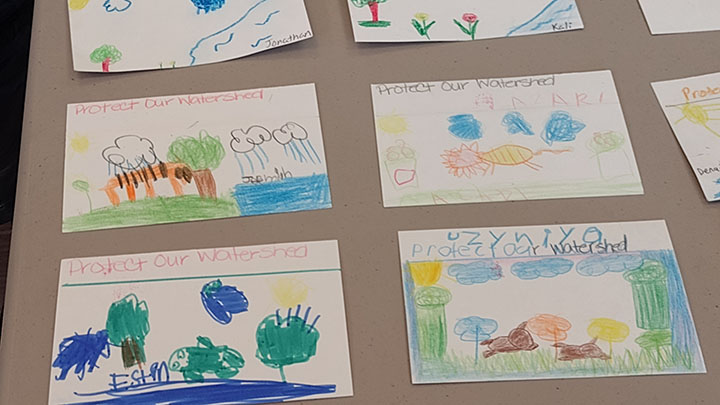Jennifer Dixon Cravens (center) and the after-school program participating in watershed awareness workshops
Image Credit: All images provided by Jennifer Dixon Cravens
A healthy watershed has a multitude of implications for human and animal health: supporting sustainable waterways, helping to maintain community water quality, and reducing water treatment costs, all which contribute to a more resilient local economy. Environmental health leads to a greater standard of living and overall wellness, and University of Maryland Extension educators believe that this transfer of knowledge needs to start early, with lessons targeted specifically towards Maryland’s youth. Now, an interdisciplinary effort by the Harford County Extension team is teaching youth the connections between their local watershed, the environmental health of their community, and their own wellness.
 Jennifer Dixon Cravens, Family and Consumer Sciences, Nutrition, Health & Wellness Educator in Harford County, is partnering with 4-H, Master Gardeners, and the regional watershed restoration specialist, to teach a series of hands-on workshops to underserved youth groups in the region that build an understanding of how a clean and healthy watershed is essential to the health of their community and the Chesapeake Bay.
Jennifer Dixon Cravens, Family and Consumer Sciences, Nutrition, Health & Wellness Educator in Harford County, is partnering with 4-H, Master Gardeners, and the regional watershed restoration specialist, to teach a series of hands-on workshops to underserved youth groups in the region that build an understanding of how a clean and healthy watershed is essential to the health of their community and the Chesapeake Bay.
The activities use games and engaging experiences that give the students a sense of the interconnectedness of their waterways in their own community. A game of I Spy at a local pond helps create an awareness of what is meant to be in that environment, teaching children to identify plants and critters, as well as litter. A neighborhood walk puts those learned skills to the test, with the youth identifying storm drains, learning how water moves from the street to the Bay, and clearing drains of debris and trash to protect those waterways, accompanied by stormwater runoff lessons taught by 4-H Educator Dewayne Murphy.
“It’s a comprehensive look at environmental health and wellness for our students,” said Dixon Cravens, who’s groups – a homeschool 4-H club, and an after-school program from the Village at Lakeview Neighborhood Network Community in Edgewood, Md. – include local children ranging in age from 5-12 years learning in a non-traditional setting. “These are children who may not normally be exposed to this type of comprehensive education in a hands-on setting.”
As a Family & Consumer Science, Nutrition, Health, and Wellness Educator, Dixon Cravens worked with the students to understand not only the factors that affect water quality, but also about the water cycle, access to water, water insecurity. Partnering with Marylisa Schaedel, 4-H Program Assistant, the students participated in “Watchful Water,” an assignment designed to help the students understand how much water it takes to grow common foods and how much water is actually in those foods, helping them recognize the importance of water conservation.
Students were tasked with sharing this information with their communities and parents as well, and created postcards designed and crafted by the students to send to local seniors to help create outreach to invested citizens, says Dixon Cravens. “Watershed restoration and being a good steward apply to everyone, not just people in those careers. It’s everyone’s job in the community to protect their waterways and environmental health,” Dixon Cravens said.
The youth groups are also working with Harford County Master Gardener Joyce Browning, learning to identify native and invasive species. The students will assist in the planting of a rain garden during the spring to learn about water conservation and have already begun learning planting techniques during a project where they were sent home with two of their own plants to care for.
“That really invests a student – it’s not just taking home a piece of paper, the lesson resonates every time they care for the plant,” Dixon Cravens said. “It makes a big difference – you want to get in front of students young so that you can be preventative.
“We have to teach children to be problem solvers,” Dixon Cravens says. “We want to make sure we’re teaching youth how to be problem solvers – assess what’s going on and make decisions about what to do, and continue to be good stewards for the environment.”
This project was funded by the University of Maryland College of Agriculture and Natural Resources Strategic Initiative for Healthy Watersheds and the Chesapeake Bay. For more information on the College of Agriculture and Natural Resources Strategic Initiative for Healthy Watersheds and the Chesapeake Bay, go to https://agnr.umd.edu/about/strategic-initiatives/ensure-healthy-watersheds-and-chesapeake-bay.